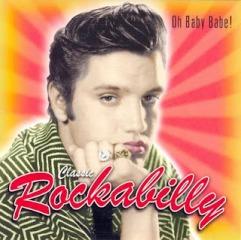Classic Rockabilly Vol. 4 Oh Baby Babe! (2007)
Classic Rockabilly Vol. 4 Oh Baby Babe! (2007)

1. How About Me Pretty Baby - Jimmy Johnson 2. Rockin' With My Baby - Malcolm Yelvington 3. Oh Baby Babe - Johnny Burnette Trio 4. Shadow My Baby - Glenn Barber 5. Let's Elope Baby - Janis Martin 6. Don't Cry Baby - Cal Veale 7. My Baby Left Me - Elvis Presley 8. You're My Big Baby Now - Roy Moss 9. Usta Be My Baby - Sanford Clark 10. You're My Baby - Roy Orbison 11. Barefoot Baby - Janis Martin 12. Don't Go Baby (Don't Go) - Al Coker 13. Ballroom Baby - Dick Lory 14. No No Baby - Al Ferrier 15. Mama's Little Baby - Junior Thompson 16. Come Back Baby - Pat Cup 17. Gone Baby Gone - Ray Smith 18. Lie To Me Baby - Johnny Tyler 19. Don't Shoot Me Baby - Bill Bowen 20. Everybody's Lovin' My Baby - Charlie Feathers 21. I Gotta Go Get My Baby - Justin Tubb 22. My Baby Is Gone - Cleve Warnock 23. My Baby Done Gone Away - Al Ferrier 24. My Baby Done Left Me - Farmer Boys 25. Bottle To The Baby - Charlie Feathers 26. Sleep Rock-A-Roll Rock-A-Baby - Alvis Wayne 27. Moo Mama - Ben Hall 28. Come On Little Mama - Ray Harris 29. Hip Shakin' Mama - Jackie Cochran 30. Hot Hot Mama - Jimmy Stayton
While the Sun Sound was the pinnacle of rockabilly, several performers established legends of their own outside of Sam Phillips's studio. Gene Vincent's 1956 sides, featuring his breathy vocals and the speed-of-light guitar of Cliff Gallup from his backing band the Blue Caps, were usually brilliant. Eddie Cochran brought a sophisticated brand of teenage rebellion to his rockabilly hits, which helped pioneer the use of overdubbed guitars and vocals. Ricky Nelson recorded first-class rockabilly pop in Hollywood with the help of ace guitarist James Burton. Johnny Burnette and his trio recorded some of the raunchiest Elvis-derived rock & roll of the time, including the first rock version of "The Train Kept A-Rollin'." Dale Hawkins cut a crackling classic with "Suzy Q," and Wanda Jackson's raspy rockabilly sides rank as the finest rock & roll recorded by a female singer in the 1950s.
Rockabilly began to fade as a commercial force around 1958, not just because of fickle popular taste, but because of the rapid evolution of rock & roll itself. One of the greatest rockabilly singers, Buddy Holly, displayed a facility for melodic invention that branched into all forms of pop/rock, and had a far-reaching influence on all of pop that extended to the British Invasion. Along with the Everly Brothers and Ricky Nelson, he began gravitating towards a more gentle, melodic sound that was not as structurally limited, if not as energetic, as pure rockabilly. Elvis himself was moving toward more straightforward rock material, and then toward pop after his hitch in the Army.
Those performers that stuck with the basic rockabilly sound faced diminishing returns. Some, like Gene Vincent, simply vanished from the charts, although they maintained loyal audiences, especially overseas. Roy Orbison, never comfortable as a rockabilly singer in the first place, reinvented himself as a masterful crooner of pop/rock ballads. Jerry Lee Lewis's career was crippled by scandal. Eventually he would find success in the country & western mainstream, a path followed by many other singers who had achieved limited success with rockabilly.
Rockabilly never returned to the charts in a significant way after the '50s, though several acts have scored big hits in the style, such as Billy Swan and the Stray Cats. A huge influence on the early Beatles, Creedence Clearwater Revival, and others, rockabilly was instrumental in establishing the focus of rock & roll on the electric guitar-bass-drums combination, with a simple joy and force that has helped inspire generations of musicians. --Richie Unterberger, AMG
download (mp3 @128 kbs):
yandex mediafire uloz.to cloudmailru gett
Last Updated (Sunday, 31 December 2017 22:18)








